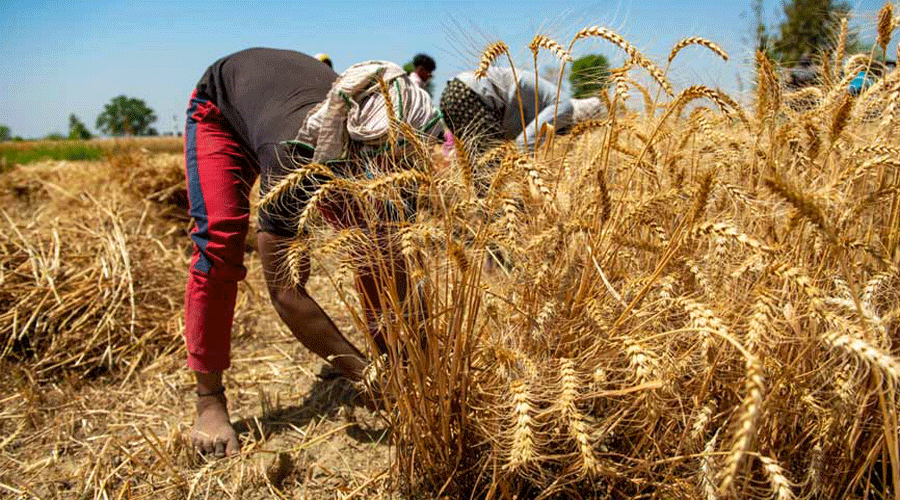The unavailability of wheat in the open market has compounded the financial woes of the Mamata Banerjee government and has cast a shadow on the future of Rajya Khadya Suraksha Yojana (RKSY), under which foodgrain is provided to people free of cost or at low rates.
RKSY has two categories of beneficiaries based on their needs. Nearly two crore beneficiaries used to get 3kg of wheat and 2kg of rice every month free of cost under RKSY-I.
More than 80,000 beneficiaries are covered under RKSY-II and they used to get 1kg of wheat and 1kg of rice at low rates. “The problem is that we are not able to buy wheat from the open market because of low production and aggressive procurement by private buyers. Now, we are being forced to replace wheat with rice, which is a costly affair,” said a senior state government official.
The shortage of wheat is a nationwide phenomenon, said a source. The Union agriculture ministry’s data suggest that wheat production fell to 107.74 million tonnes in the 2021-22 crop year (July-June) from 109.59 million tonnes in the previous year because of heat waves in a few states.
The low production resulted in a sharp fall in procurement to 19 million tonnes this year from around 43 million tonnes last year.
The shortage prompted the central government to impose a ban on exports, but the situation is yet to normalise. Sources said the state government was facing a crisis as each kg of rice cost Rs 12 more than a kg of wheat.
According to a rough estimate of the food and supplies department, the state is being forced to spend an additional amount of Rs 84 crore every month to supply rice, instead of wheat.
“We buy paddy directly from the farmers and then the paddy is sent to rice mills. The rice mills send rice back to us. After the entire exercise, a kg of rice costs Rs 34. But we used to buy wheat from the open market at Rs 22 a kg. The gap of Rs 12 is hurting the state exchequer dear,” said another official.
The sources, however, said the wheat prices had also been moving northwards because of a demand-supply mismatch. While Union agriculture ministry sources think the supply bottlenecks will be eased once procurement for this year begins in April, state government officials are counting excess outflow on account of the non-availability of wheat.
The officials said as the Bengal government was spending an additional amount of Rs 84 crore every month, it was projected that the state might be forced to spend more than Rs 1,000 crore extra at the end of the financial year.
“This is a huge amount considering the fact the state is already spending more than Rs 5,000 crore annually to run RKSY. If the funds cannot be arranged soon, the smooth running of the scheme may be affected in the next couple of months,” said a bureaucrat.
Trinamul Congress insiders have said the situation became a headache for the ruling establishment because rural polls are set to be held within a couple of months.
“This particular scheme had given us a dividend in the past elections. If the scheme is hit because of a financial crunch, we may have trouble in the rural polls,” said a minister.
“The state government is trying hard to arrange funds to run the scheme smoothly, but no breakthrough is yet to be found. That is why the state government is contemplating writing to the Centre to provide rice for the RKSY scheme. The chief minister had already demanded during her speech in the Assembly that the Centre supply the state with rice for RKSY beneficiaries,” said a bureaucrat.
The Centre supplies 5kg of foodgrains to each of 6.01 crore beneficiaries in the state under the National Food Security Act (NFSA) at a low rate. The state provides cheap food grains to 2.8 crore people who are not covered under the NFSA. There are debates within the state government about whether the state should continue with the scheme as almost all needy people are covered under the NFSA.
“But the state wants to continue with the scheme as it gave the ruling party benefits over the past few years. Now, the state has to find a way to run the scheme smoothly,” said a source.
A section of the officials said the state government had initially thought that cancelling fake ration cards would help it.
“The state has already cancelled 1.8 crore ration cards for various reasons, including non-existence of beneficiaries and mismatching of Aadhaar biometric. But still, the state has to pay an additional amount of Rs 84 crore these days to give rice, instead of wheat. So, finding a solution to the problem is not that easy,” said a source.











